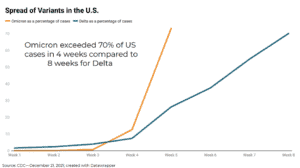By Ethan Weinstein
“We’re about to face another challenge,” Governor Scott said Tuesday, preparing Vermonters for the coming dual threat of Omicron and the expected post-Christmas surge.

Omicron exceeded 70% of U.S. cases in 4 weeks compared to 8 weeks for Delta. Data as of Dec. 21, 2021.
This week, the state detected the first case of the Omicron variant in Lamoille County. As the latest data suggests a booster vaccine dose provides far more protection against omicron than only two shots, the governor doubled down on stressing the importance of a third shot.
“Don’t consider yourself fully protected until you have [gotten your booster],” he said.
According to the CDC, 37.7% of Covid cases in New England in the past week were the Omicron variant, though that figure was likely lower in Vermont. In New York and New Jersey, a staggering 92% of new cases were Omicron.
Overall cases in Vermont remained steady in the last week, down 16% from two weeks ago. Hospitalizations fell by 23% in the last seven days.
Despite a week that did not see case rates worsen, Mike Piecak, who discusses Vermont’s Covid data analyses, said that there may be days with over 1,000 positive tests after the holidays, numbers that have never been seen in Vermont.
Rutland County reported 39 new cases on Tuesday, bringing the 14-day case total to 767. Meanwhile, Windsor County reported 11 new cases on Dec. 21, with 661 cases in the last 14 days. The statewide, seven-day rolling case average is 408.
According to AHS Sec. Mike Smith, 30 FEMA staff members are currently deployed at UVM Medical Center and Southwester Medical Center to ease the fatigue of hospital staff. It is not clear how long these federal employees will be in Vermont.
And as Vermonters hold their breath waiting for the coming Omicron surge, Dept. of Health Commissioner Dr. Mark Levine said that “while illness [caused by Omicron] may be less severe, a larger number of cases will mean greater stress on our health care systems.”
The monoclonal antibodies used to treat infection with the Delta variant are not effective against Omicron, Levine said. The federal government is slowly distributing monoclonal antibodies meant to target Omicron.




